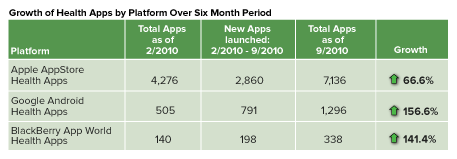 Adoption of smartphones in the US only hovers around 20 percent. Most people today do not have smartphones. In turn, most people do not have access to health related apps created for smartphones.
Adoption of smartphones in the US only hovers around 20 percent. Most people today do not have smartphones. In turn, most people do not have access to health related apps created for smartphones.
Few, however, would disagree that smartphones will likely prove to be a key platform for mobile health innovation. We are tracking these platforms closely.
MobiHealthNews has written extensively about Pew's recent survey on the adoption rate of mobile health apps. A full 9 percent of American mobile phone users said they have a mobile health app on their phone that enables them to "track" or "manage" their health.
As our new research report -- "The Fastest Growing and Most Successful Health & Medical Apps” -- explains, most mobile health apps available today do not help you track or manage your health. Most only provide reference information about health issues.
 Our report examines the current state of health and medical related apps available through Apple’s AppStore and BlackBerry’s App World plus the apps available for Google’s Android platform. This report builds on our inaugural health apps study: “The World of Health and Medical Apps”, which we published in February 2010. Since then, how has the world of health and medical apps changed? Which types of apps have seen the most growth between February and September of 2010? According to Apple’s ranking system of Top 1000 apps – which apps in particular have proven to be most successful to date? Which types of apps dominate the Top 1000?
Our report examines the current state of health and medical related apps available through Apple’s AppStore and BlackBerry’s App World plus the apps available for Google’s Android platform. This report builds on our inaugural health apps study: “The World of Health and Medical Apps”, which we published in February 2010. Since then, how has the world of health and medical apps changed? Which types of apps have seen the most growth between February and September of 2010? According to Apple’s ranking system of Top 1000 apps – which apps in particular have proven to be most successful to date? Which types of apps dominate the Top 1000?
This MobiHealthNews report, “Fastest Growing and Most Successful Health and Medical Apps” will answer these questions and more.
As the table above shows, between February and September the fastest growing platform for health related apps was Google's Android. While the number of Android health related apps more than doubled, the total number of health related apps for the platform still pales in comparison to Apple's AppStore. The AppStore now boasts more than 7,000 health related apps. These figures do not include apps that were miscategorized and placed into the health categories -- just the relevant health-related ones.
So how have health related apps grown in number overall? Since February health apps available for devices using the three major platforms of Apple iOS, BlackBerry, and Android, grew in number by 78 percent.










